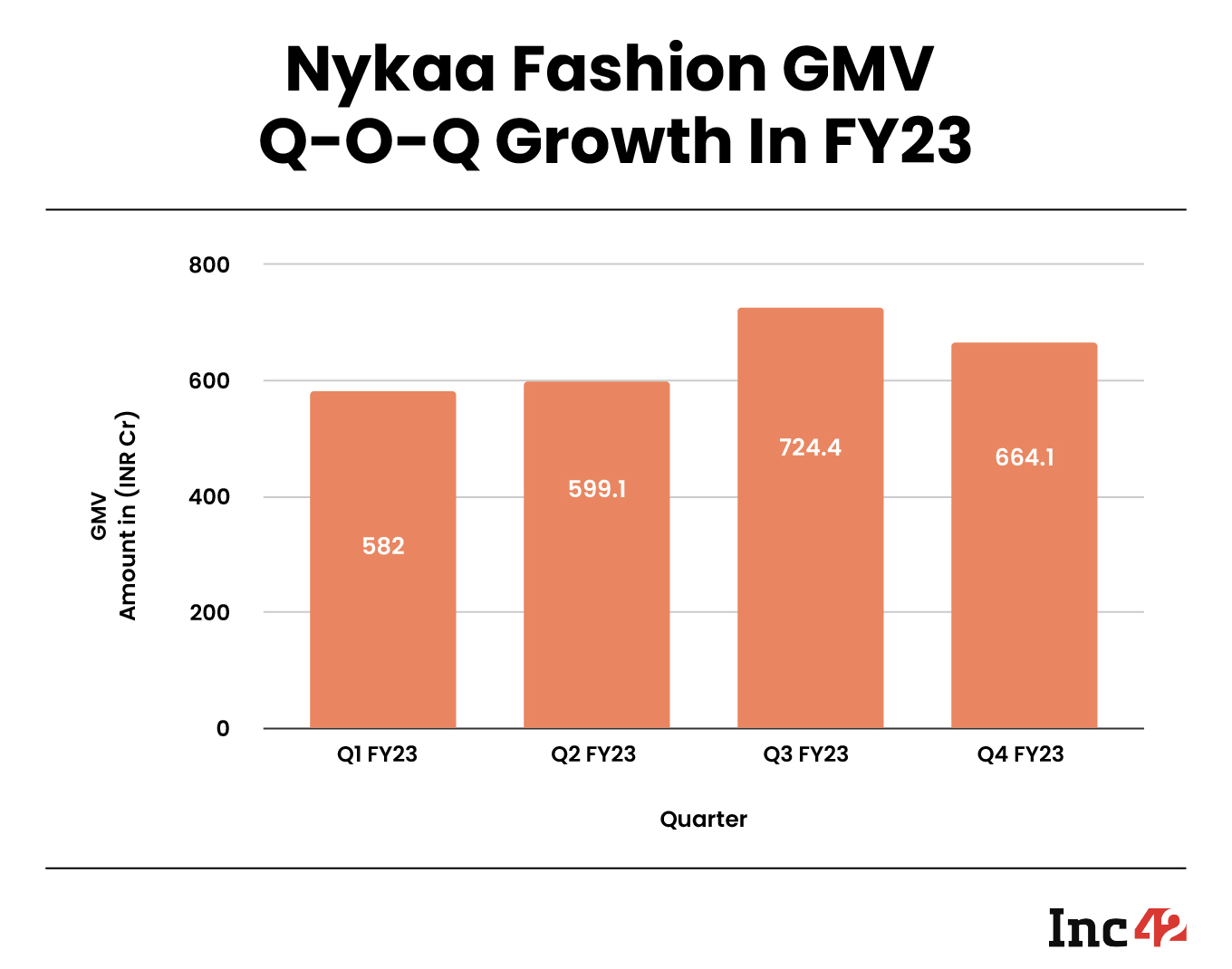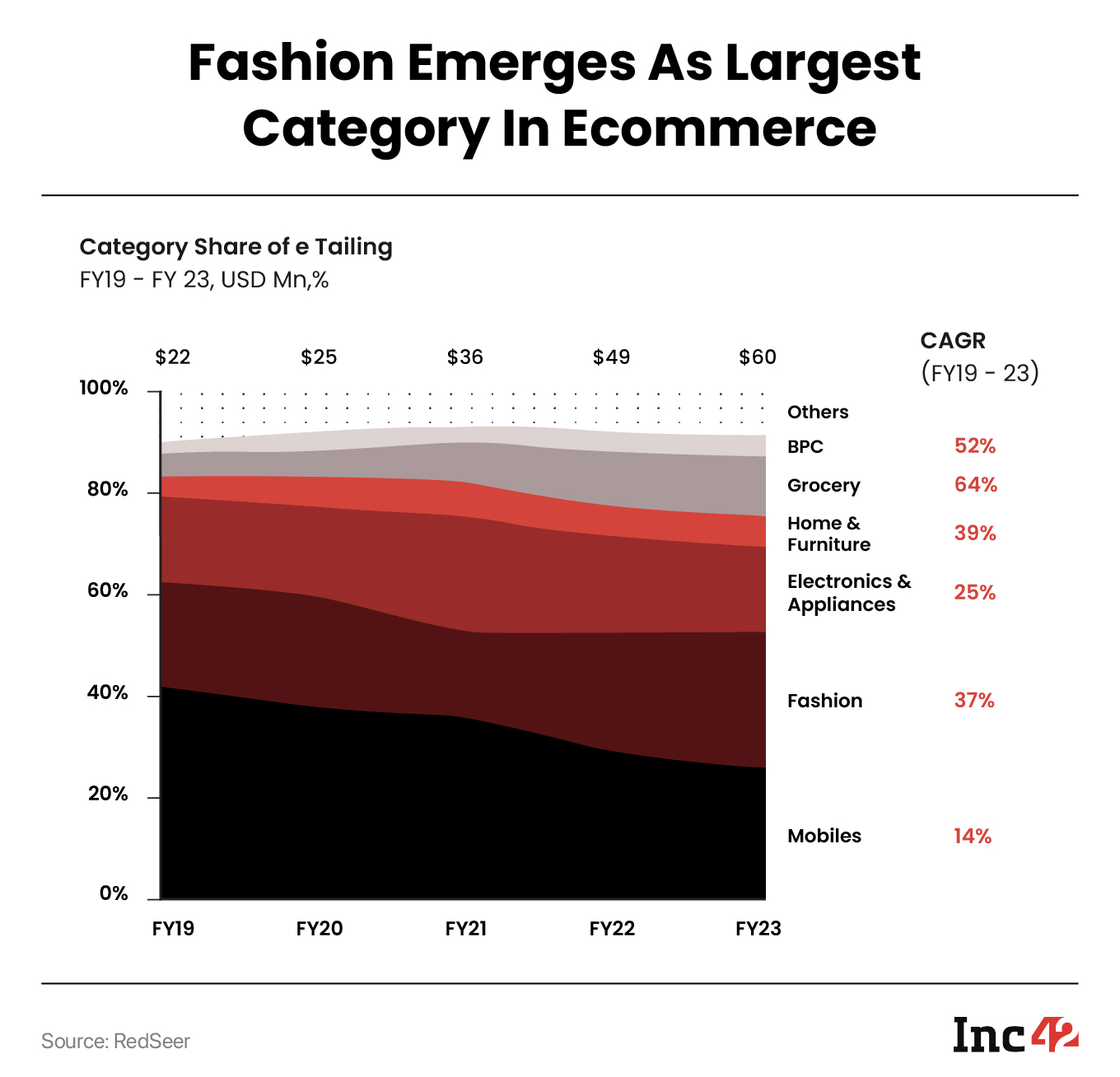With growing competition from platforms such as AJIO and Myntra, along with deep-pocketed players like Tata CLiQ, Nykaa’s fashion vertical seems to be struggling to grow its market share
Nykaa’s plan to move away from its discount-based model could push many of its users to rival platforms
For marketplaces like Nykaa Fashion, private labels or owned brands could be a good growth driver, experts believe
When the Indian ecommerce market was still in its nascent stages, Nykaa emerged as a reliable brand name in the online makeup and skincare product segment. After securing its crown in the beauty and personal care (BPC) space, Nykaa diversified into the fashion business in 2018.
Up until now, Nykaa, the poster child in the Indian beauty ecommerce sector, has remained successful in impressing the industry with its growth. However, with competition intensifying from AJIO and deep-pocketed players like Tata CLiQ, Nykaa’s fashion vertical, Nykaa Fashion, seems to be struggling to hold on to its market share today. Additionally, we cannot forget Myntra, an already-established player in the fashion ecommerce space.
In addition, the sulking Q4 FY23 numbers of the listed unicorn have added to its woes. During the quarter, all key metrics, including gross merchandising value (GMV), monthly average unique users, visits and order conversion, declined on a sequential basis. Furthermore, the vertical’s contribution margins worsened year-on-year (YoY) in FY23.
“When we’re building any new business, there’s a year of sort of like peak loss, peak investment. I feel FY23 was that year for fashion and the intent is, down the corner, you are coming down the hill from there. So, it was also sort of the peak year of investment and it is sort of the natural cycle of building a new business,” Adwaita Nayar said in the Q4 earnings call.
Although Nayar says it is a problem of the natural cycle, analysts believe that the slowdown of Nykaa Fashion’s growth is a multi-pronged issue.
For starters, the company competes with the likes of AJIO and Myntra, which are not only cash-rich but also very actively innovating through new launches and partnerships.
Another major threat to Nykaa Fashion’s market share is Tata Group, which is leaving no stone unturned to boost its fashion ecommerce business, Tata CLiQ. Last month, Tata Digital appointed former Nykaa chief business officer Gopal Asthana as the CEO of Tata CLiQ. Last year, Tatas infused INR 1,600 Cr into Tata UniStore, the parent entity of Tata CLiQ.
While the competition is rising in the space, the Indian ecommerce sector is noticing a slowdown due to a fall in customers’ discretionary spending, which is again a concern for Nykaa Fashion.
Why Is Nykaa Fashion Staggering?
Even before publishing its quarterly report, Nykaa indicated a slowdown in the fashion business in a filing. “Consumer pullback in discretionary spending has had some impact on our fashion business, leading to subdued growth in net sales value (NSV) this quarter,” the company said.
Speaking with Inc42, for this story, Elara Capital’s senior vice-president Karan Taurani said that one of the major reasons for Nykaa Fashion’s slowing growth is the decline in consumers’ discretionary spending. “Hence, it shouldn’t be a long-term concern for the company,” he added.
Besides, Nykaa Fashion is gradually moving away from discount-based models, which could be another reason for the decline in GMV. “Fashion is still a price-sensitive market in India, customers will move to platforms that offer more discounts,” Roma Dixit, the director of insights and consulting at 1Lattice, said.
 In addition, offline fashion retail has picked up since mid-2022, intensifying competition for online players, including the ones who sell on ecommerce marketplaces.
In addition, offline fashion retail has picked up since mid-2022, intensifying competition for online players, including the ones who sell on ecommerce marketplaces.
“We are seeing that shoppers are moving back to the offline experience, and the online spike that we saw over the last couple of years has now substantially reduced. This is because the shoppers are back in the store,” Dixit added.
This could also have an impact on Nykaa Fashion’s premiumisation playbook, especially when the company is seeing it as one of its key growth drivers.
In the fashion segment, most shoppers looking to buy premium products prefer to visit offline stores as they get to experience products and then choose. However, in Nykaa’s case, most premium products, under the heavy ticket-size category, still do not offer replacements or returns on Nykaa Fashion.
Moving on, given that Nykaa is making a shift from the discount-based model, it could push many of its users to rival platforms like Myntra and AJIO.
Shein’s India Re-Entry Another Headache?
The re-entry of Shein, a popular GenZ-focussed, fast-fashion brand, could be a major cause of concern for Nykaa and other online fashion marketplaces, especially when Reliance Retail is navigating its India revamp.
While analysts believe that Shein’s entry, along with Urbanic bolstering its D2C presence, will accelerate the fast-fashion trend in India, it will be the players like Nykaa that could feel the need to forge new similar partnerships to save their market share.
Interestingly, AJIO may be looking at better days, with the Shein-Reliance Retail partnership, and could replicate in-house strategies to capture Gen Z’s ever-evolving aspirations.
“For many other players to stay relevant and attractive in the market, they will also have to look for similar partners and opportunities. Lately, we have observed that smaller Indian brands that focus on quick fashion trends do well. So, many marketplaces will now need to identify such brands to stay relevant,” Dixit said.
According to Elara Capital’s Taurani, although it will not be surprising that AJIO, the ecommerce arm of Reliance Retail, is going to take some advantage of Shein’s presence, the partnership may not shake up the market as it is fragmented in nature.

In this segment, customers are often spoiled for choices, and competitive intensity in fashion merchandise online sales has always been high. Despite this, there has not been any kind of major consolidation so far in the online fashion retail segment in the last seven to eight years.
Promising Times For D2C Fashion Brands?
According to Sumit Jasoria, the cofounder of fast-fashion startup NewMe, the overall fashion ecommerce is on the cusp of a transition, and the way fashion marketplaces built their companies approximately 10 years ago will need to reinvent themselves now.
“Ten years ago, Indian consumers were not as aspirational as they are today. With cheap data and easy access to social media platforms like Instagram, the consumer mindset has changed, and fashion is a different ball game now,” Jasoria said.
As the industry is looking at a transformation, analysts believe that this is a good time for D2C fashion brands, such as FabAlley, The Souled Store, Bewakoof, and FableStreet, to grow. This is a time when the fashion industry will see these D2C brands bringing a change in the segment, just as startups like Mamaearth, Sugar, and Plum did in the BPC segment a few years back, we were told.
“D2C brands already have differentiators and have established trust among consumers. Customers are more open to experimenting with new brands and pay more if the product quality is good,” an analyst said.
How Can Nykaa Fashion Stay Ahead Of The Curve?
Despite the intensifying competition, the ray of hope is that fashion has emerged as the largest category in online retail in India due to a maturing user base, accounting for 37% of the overall online shopping currently, according to RedSeer, a consulting firm. Moreover, the increasing share of women shoppers has resulted in an explosion in the sale of fashion and beauty products.
 “To leverage the opportunities in this growing market, Nykaa Fashion will have to look at exclusive partnerships similar to what Myntra did a couple of years ago by bringing H&M on its platform,” 1Lattice’s Dixit said.
“To leverage the opportunities in this growing market, Nykaa Fashion will have to look at exclusive partnerships similar to what Myntra did a couple of years ago by bringing H&M on its platform,” 1Lattice’s Dixit said.
Tata CliQ, another emerging rival of Nykaa Fashion, has also added many niche boutique brands to its portfolio. Last month, luxury multi-brand retailer TimeVallée entered into a partnership with Tata CLiQ Luxury to launch its exclusive digital boutique in India.
For marketplaces like Nykaa Fashion, private labels or owned brands could be a good growth prospect, experts believe. Nykaa Fashion is also betting big on its own brands such as Nykaa, and private labels such as Pipa Bella. Its in-house brands currently account for 12.5% of consolidated GMV for Nykaa Fashion.
“Private labels across platforms have done really well, be it beauty or apparel. When Myntra entered the market, it also had multiple private labels, including Roadster, HRX, Dressberry, Mast and Harbour, just to name a few, which have now grown exponentially,” an analyst told.
Moreover, as these online marketplaces are sitting on piles of data, it is easy for them to innovate based on consumer feedback and improve brands accordingly.
Overall, analysts believe, the fashion segment in online shopping is about to see a big transformation. Many new fast-fashion startups are emerging, shopping behaviour is changing significantly, and offline retailers such as Zara, H&M, ONLY are also building their omnichannel presence.
While there will be an exodus of consumers to new platforms, a large chunk of consumers will also prefer aggregators to explore more options. This is where Nykaa Fashion will have an opportunity to grow and sustain its consumer base. But to do that it will have to focus on offering differentiation and as many options as possible on its platform.
































 Ad-lite browsing experience
Ad-lite browsing experience